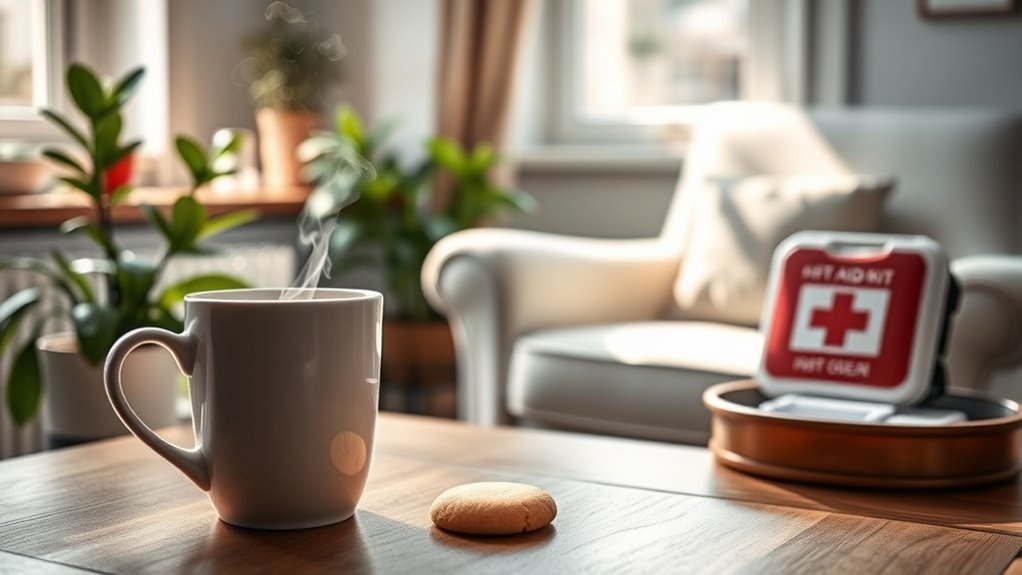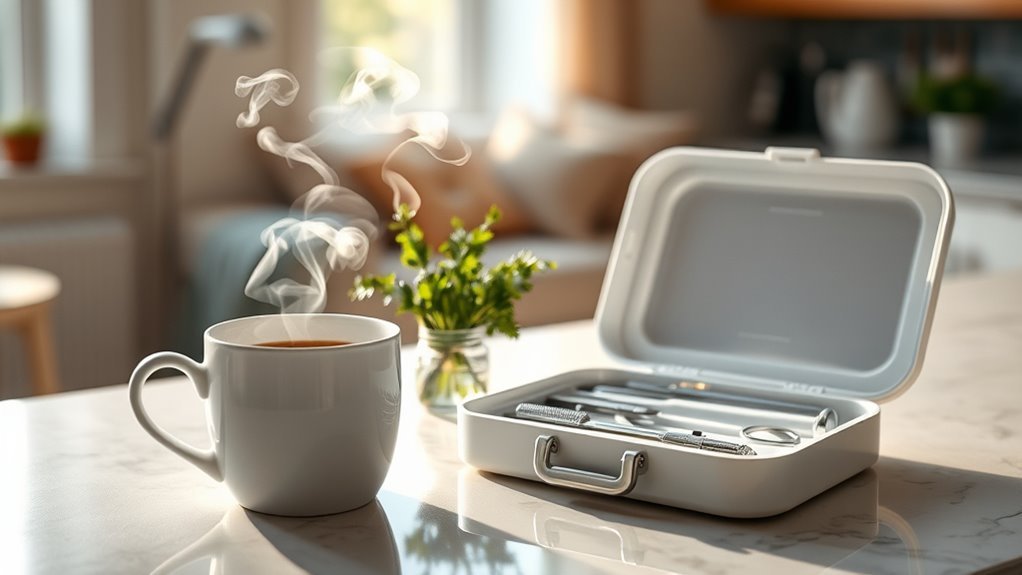Can I Drink Decaf Coffee After Tooth Extraction
You can drink decaf coffee after tooth extraction, but you should take some precautions. Decaf is less stimulating than regular coffee, which can help avoid jitters and aid in hydration. However, be mindful of the temperature, as hot beverages can irritate the extraction site. It’s best to wait until a few days post-surgery, and monitor how your body reacts. If you’re curious about the best practices for consuming decaf and other beverages during recovery, there’s more to explore.
Understanding Tooth Extraction Recovery

When you undergo a tooth extraction, understanding the recovery process is essential for a smooth healing experience. Effective pain management is key during this time, so be sure to follow your dentist’s recommendations for medications. Over-the-counter pain relievers can help alleviate discomfort, but don’t hesitate to reach out to your dentist if you experience severe pain.
Maintaining proper oral hygiene is also vital. While it’s important to keep the extraction site clean, you should avoid vigorous rinsing or brushing directly on the area for the first few days. Instead, gently rinse with a saltwater solution after 24 hours to promote healing. By prioritizing pain management and oral hygiene, you can enjoy a more comfortable recovery and regain your freedom to eat and speak normally.
The Role of Caffeine in Healing
While caffeine can provide a temporary boost in energy and alertness, its role in the healing process after a tooth extraction is more nuanced. Understanding the caffeine effects on your body can help you make informed decisions.
- Caffeine can constrict blood vessels, potentially slowing down healing.
- It may increase anxiety and discomfort, impacting your recovery experience.
- However, moderate caffeine intake can enhance mood and reduce fatigue.
Ultimately, you’ll want to listen to your body and consult your dentist for personalized advice. Balancing caffeine consumption is key to ensuring a smoother healing process, allowing you to feel more at ease during your recovery.
Decaf Coffee: What You Need to Know

Decaf coffee can be a comforting choice after a tooth extraction, especially if you’re looking to avoid the potential downsides of caffeine. It offers the rich flavors and aromas of regular coffee without the stimulating effects that could hinder your recovery. One of the main decaf benefits is that it allows you to enjoy your favorite beverage while minimizing anxiety or sleeplessness. There are numerous decaf varieties available, ranging from smooth and mild to bold and robust, ensuring you can find one that suits your palate. Additionally, many decaf options are made from high-quality beans, so you don’t have to compromise on taste. Enjoying decaf can help keep your spirits up as you heal.
Potential Benefits of Drinking Decaf After Extraction
Drinking decaf coffee after a tooth extraction can offer several benefits that support your recovery. Many people appreciate the decaf benefits, which make it a suitable alternative to regular coffee. Here are some advantages of choosing decaf:
- Reduced Stimulation: Decaf provides a gentle caffeine alternative, helping you avoid jitters while still enjoying your favorite beverage.
- Hydration: Staying hydrated is essential post-extraction, and decaf coffee can contribute to your fluid intake without the dehydrating effects of caffeine.
- Comforting Ritual: Sipping on a warm cup can provide psychological comfort during your recovery, making the healing process more enjoyable.
Possible Risks Associated With Decaf Coffee

While decaf coffee may seem like a safe option after tooth extraction, there are some risks to take into account. Caffeine, even in small amounts, can still impact your healing process, and the acidic nature of coffee might irritate your gums. Additionally, consuming hot beverages can pose temperature sensitivity issues that could be uncomfortable during recovery.
Caffeine’s Impact on Healing
Although decaf coffee contains considerably less caffeine than regular coffee, it still poses potential risks during the healing process after a tooth extraction. Caffeine metabolism can vary among individuals, and even small amounts may impact your recovery. Here are some considerations:
- Increased heart rate: Caffeine can elevate your heart rate, potentially affecting blood flow to the extraction site.
- Dehydration: Caffeine acts as a diuretic, which might lead to dehydration, hindering your body’s ability to heal.
- Pain sensitivity: Some studies suggest that caffeine can alter pain perception, possibly making you more aware of post-extraction discomfort.
It’s essential to weigh these risks and consult with your dentist before consuming decaf coffee during this critical healing period.
Acidic Nature Concerns
Given that decaf coffee is still acidic, it can pose additional concerns for your healing process after a tooth extraction. While it may seem harmless, the coffee acidity can irritate your surgical site, potentially hindering your recovery. Acidic beverages can affect the pH balance in your mouth and may lead to discomfort or sensitivity, particularly in the days following the procedure. This irritation could make it more challenging to manage pain or inflammation. It’s vital to evaluate how decaf coffee fits into your post-extraction diet. If you’re craving that warm beverage, you might want to explore alternative options that are gentler on your healing gums, ensuring you prioritize your recovery during this significant time.
Temperature Sensitivity Issues
After a tooth extraction, you may find that your mouth is particularly sensitive to temperature changes, making it essential to take into account how hot or cold beverages, including decaf coffee, could affect your healing process. Consuming decaf coffee at extreme temperatures can lead to oral discomfort, which may prolong your recovery time.
Consider these tips to minimize temperature sensitivity issues:
- Opt for lukewarm decaf coffee to avoid aggravating your sensitivity.
- Avoid ice-cold beverages, as they can cause sharp discomfort.
- Listen to your body; if you experience pain, it’s best to wait before enjoying your next cup.
Recommended Timeline for Resuming Beverages

Once you’ve had a tooth extraction, it’s crucial to be mindful of what you consume, including beverages. Following a recommended timeline can help guarantee a smooth recovery. Initially, stick to clear liquids, gradually reintroducing other drinks as you heal. Here’s a simple guide to help you navigate your beverage choices:
| Days Post-Extraction | Recommended Beverages | Notes |
|---|---|---|
| Day 1 | Water, Broth | Avoid hot temperatures |
| Days 2-3 | Herbal Tea, Juice | Make sure they’re lukewarm |
| Days 4-5 | Decaf Coffee, Milk | Moderate temperature |
| Week 2 | Regular Coffee | If no complications arise |
| After Week 2 | All Beverages | Return to normalcy |
Alternatives to Coffee During Recovery
While you may be keen to return to your regular coffee routine after a tooth extraction, there are several alternative beverages that can keep you satisfied during your recovery. Focusing on gentle options helps promote healing while still allowing you to enjoy flavorful drinks. Consider these alternatives:
- Herbal teas: Opt for caffeine-free varieties like chamomile or peppermint, which can be soothing and hydrating.
- Smoothie options: Blend soft fruits like bananas or berries with yogurt or almond milk for a nutritious treat that’s easy on your mouth.
- Infused water: Enhance plain water with slices of cucumber, lemon, or berries for an invigorating twist that keeps you hydrated.
These alternatives can help you stay energized while prioritizing your recovery.
Tips for Enjoying Decaf Coffee Safely

If you’re enthusiastic to enjoy a warm cup of decaf coffee after your tooth extraction, it’s important to approach it with care. Start with proper decaf preparation; make certain your coffee is brewed at a comfortable temperature to avoid irritation. You might want to let it cool slightly before sipping. Explore different flavor options to enhance your experience—consider adding a splash of milk or a hint of vanilla for a soothing taste. Avoid overly sweetened or acidic additives, as they can impact your healing process. Opt for decaf brands that are gentle on the stomach, and always listen to your body. If something feels off, it’s better to pause and consult your dentist for personalized advice. Enjoy your coffee mindfully!
When to Consult Your Dentist About Dietary Choices
After a tooth extraction, it’s essential to follow specific dietary guidelines to promote healing. If you notice any signs of complications, such as increased pain or swelling, you should consult your dentist promptly. Understanding when to seek professional advice can help guarantee a smoother recovery process.
Post-Extraction Dietary Guidelines
When recovering from a tooth extraction, it’s important to follow specific dietary guidelines to promote healing and prevent complications. Stick to soft food recommendations for the first few days. Foods like yogurt, mashed potatoes, and smoothies can be comforting and easy to eat. Remember to maintain good oral hygiene, but avoid directly brushing the extraction site for a few days.
- Stay hydrated with water, avoiding hot drinks initially.
- Introduce soft, nutritious foods gradually to guarantee comfort.
- Consult your dentist if you have concerns about your diet or experience discomfort.
Listening to your body and sticking to these tips will help you recover smoothly, allowing you to enjoy your favorite foods again soon.
Signs of Complications
While most people experience a smooth recovery after tooth extraction, it’s vital to be aware of signs that may indicate complications. If you notice excessive swelling signs that worsen over time, it could signal an infection or other issues. Pay attention to any persistent or unusual bleeding indicators; a little bleeding is normal, but if it continues beyond a day or two, reach out to your dentist. Additionally, if pain intensifies instead of subsiding, this may be a red flag. It’s important to listen to your body—if something doesn’t feel right, don’t hesitate to consult your dentist. They can provide guidance on dietary choices, including whether decaf coffee is suitable for your recovery.
Frequently Asked Questions
Can I Add Sugar or Cream to My Decaf Coffee Post-Extraction?
When it comes to adding sugar or cream to your decaf coffee post-extraction, you’ll want to tread lightly. While it’s generally safe to use sugar alternatives, be mindful of any ingredients that could irritate your healing gums. As for cream options, stick to non-dairy choices if you’re sensitive. Just remember, moderation is key, and keeping it simple can help you avoid any unnecessary bumps in the road during your recovery.
How Long Should I Wait Before Drinking Any Coffee After Extraction?
After a tooth extraction, it’s best to wait at least 24 hours before drinking any coffee. This gives your body time to start the healing process. Caffeine can potentially interfere with blood flow and increase swelling, which isn’t ideal during recovery. If you’re keen to enjoy a warm beverage, consider waiting a bit longer, as your comfort and healing are the priorities. Always listen to your body and consult your dentist for personalized advice.
Is Decaf Coffee Safe for Children After Tooth Extraction?
Isn’t it important to guarantee your child’s comfort during recovery? Decaf coffee can be safe for children after tooth extraction, as it offers benefits like reduced caffeine jitters and a soothing warm beverage. However, it’s essential to monitor their reactions, as everyone’s recovery process differs. Confirm they’re staying hydrated with plenty of water and consider decaf as a gentle treat to support their healing journey. Always consult with your dentist for personalized advice.
Can Decaf Coffee Affect My Medication After Surgery?
When considering decaf coffee’s safety after surgery, it’s important to understand potential medication interactions. While decaf generally has lower caffeine levels, some medications may still be affected by even small amounts of caffeine. It’s best to discuss your specific medications with your healthcare provider to guarantee there are no adverse effects. Always prioritize your health and follow professional guidance to enjoy your freedom without compromising your recovery.
What Are the Signs of Complications After Consuming Decaf Coffee?
Imagine a balloon; if you poke it, it might pop, just like how your body reacts to complications. After sipping decaf coffee, watch for signs like increased swelling or lingering pain. These issues can signal underlying problems, impacting your pain management. If you notice heightened discomfort or unusual swelling, it’s essential to consult your dentist, ensuring you maintain your health and freedom from complications. Stay vigilant; your body’s responses matter!






